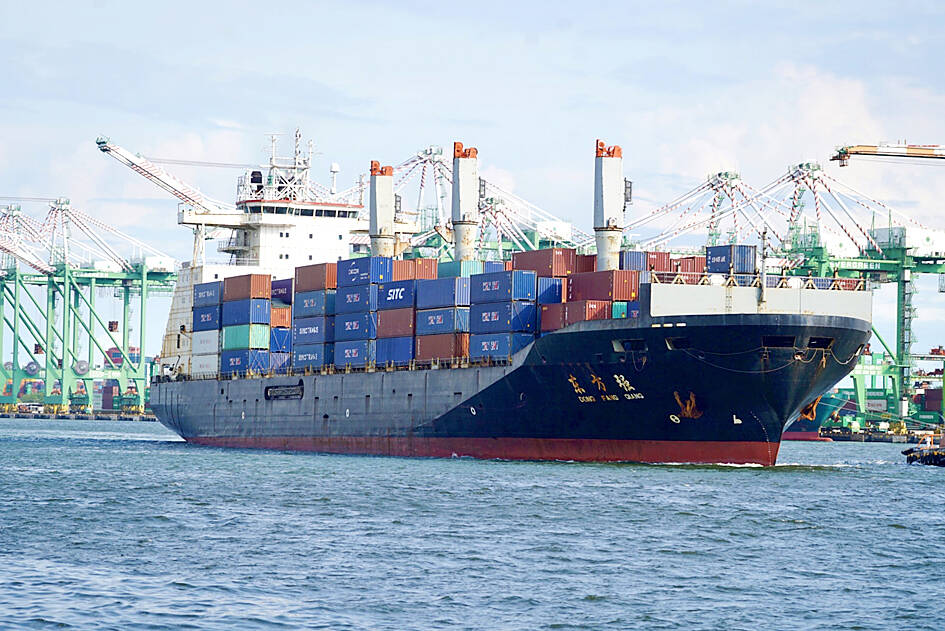Taiwan’s largest corporations are set for another profitable year as global capacity constraints and supply shortages linger, Taiwan Ratings Corp (中華信評) said yesterday.
Over the next few quarters, most companies would be able to tackle increasing business and financial risks caused by weakening operating conditions, the local arm of Standard & Poor’s (S&P) Global Ratings said.
“We expect profitability in most sectors to remain above mid-cycle levels, down moderately from record highs last year,” Taiwan Ratings credit analyst David Hsu (許立德) told an online news conference.

Photo: CNA
High commodity prices, rising inventory levels and flagging demand pose downside risks next year, but migration to new technologies including 5G, cloud computing, electric vehicles and Internet of Things applications, could help offset the pain, Hsu said
Tech firms would continue to lead the pack in terms of profitability this year, supported by capacity constraints for critical components, the company said.
Strong profits last year entrenched their balance sheets and gave them more resilience against headwinds, Hsu said.
However, profit outlook for tech firms over the next 12 months is cloudy as end-market demand for consumer electronics weakens and inventory levels rise, Hsu said.
Credit quality also improved in the chemical, transportation and technology sectors last year, he said, adding that prudent and enhanced capital structures lent support to corporate credit quality.
Relatively high levels of earnings before interest, taxes, depreciation and amortization (EBITDA) tamed the effects of rising capital expenditure on debt, Hsu said.
“We believe overall debt will increase this year, but debt-to-EBITDA ratios would post positive developments in most sectors,” he said.
Taiwanese corporations would have to grapple with ongoing risks such as high energy and raw material prices, higher borrowing costs, reduced access to financing, China’s “zero COVID-19” policy and geopolitical conflicts, Taiwan Ratings said.
At the same time, they have to prepare for possible natural disasters and intensifying policy demands linked to climate change, it said.

Taiwan’s rapidly aging population is fueling a sharp increase in homes occupied solely by elderly people, a trend that is reshaping the nation’s housing market and social fabric, real-estate brokers said yesterday. About 850,000 residences were occupied by elderly people in the first quarter, including 655,000 that housed only one resident, the Ministry of the Interior said. The figures have nearly doubled from a decade earlier, Great Home Realty Co (大家房屋) said, as people aged 65 and older now make up 20.8 percent of the population. “The so-called silver tsunami represents more than just a demographic shift — it could fundamentally redefine the

The US government on Wednesday sanctioned more than two dozen companies in China, Turkey and the United Arab Emirates, including offshoots of a US chip firm, accusing the businesses of providing illicit support to Iran’s military or proxies. The US Department of Commerce included two subsidiaries of US-based chip distributor Arrow Electronics Inc (艾睿電子) on its so-called entity list published on the federal register for facilitating purchases by Iran’s proxies of US tech. Arrow spokesman John Hourigan said that the subsidiaries have been operating in full compliance with US export control regulations and his company is discussing with the US Bureau of

Businesses across the global semiconductor supply chain are bracing themselves for disruptions from an escalating trade war, after China imposed curbs on rare earth mineral exports and the US responded with additional tariffs and restrictions on software sales to the Asian nation. China’s restrictions, the most targeted move yet to limit supplies of rare earth materials, represent the first major attempt by Beijing to exercise long-arm jurisdiction over foreign companies to target the semiconductor industry, threatening to stall the chips powering the artificial intelligence (AI) boom. They prompted US President Donald Trump on Friday to announce that he would impose an additional

China Airlines Ltd (CAL, 中華航空) said it expects peak season effects in the fourth quarter to continue to boost demand for passenger flights and cargo services, after reporting its second-highest-ever September sales on Monday. The carrier said it posted NT$15.88 billion (US$517 million) in consolidated sales last month, trailing only September last year’s NT$16.01 billion. Last month, CAL generated NT$8.77 billion from its passenger flights and NT$5.37 billion from cargo services, it said. In the first nine months of this year, the carrier posted NT$154.93 billion in cumulative sales, up 2.62 percent from a year earlier, marking the second-highest level for the January-September